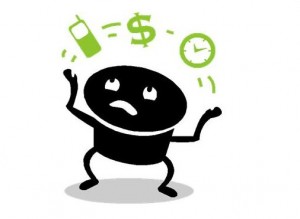 More and more articles on the web state that multitasking and doing 10 things at a time, not only hamper creativity and innovation as well as reduce people’s ability to behave in an ‘emotionally intelligent’ way; even worse, it can affect your memory and lead to stress, thus illness.
More and more articles on the web state that multitasking and doing 10 things at a time, not only hamper creativity and innovation as well as reduce people’s ability to behave in an ‘emotionally intelligent’ way; even worse, it can affect your memory and lead to stress, thus illness.
Whereas these facts are more or less known, little action is taken to reduce multitasking in work environments. On the contrary:
- People spend most of their days in calls
- At the same time they receive an enormous amount of emails, many of them ‘urgent’
- Very often, latest findings and messages have to be simultaneously posted on various external social media channels as well as fed into internal communication channels
- Urgent calls are also coming in which were not scheduled beforehand
- And: maybe you are even supposed to be in a face-2-face meeting during the day
Fortunately, we cannot clone ourselves (yet); we simply cannot be at different places at a time and do various things at once. In order to cope with the daily workload and demands, we usually try very hard to live up to everybody’s expectations.
For a certain while, we might even be able to handle all the demands and inputs successfully… but then, we normally feel overwhelmed or at least we cannot remember properly what was said in a call (where we were on ‘mute’ doing something else in the meantime) or when our colleague came to our desk to talk to us.
What should we do? We need to learn to scale down and approach tasks, demands and workload in a different, mindful way. Nobody can handle everything at the same time and people – yourself even more – deserve your unbiased attention.
You also might want to try implementing these little tips:
- Prioritise your emails: only answer the ones which are of major importance and where you are the direct recipient (not in cc and not in bcc).
- Instead of responding to chains of mails, make a quick call. Your issue might be solved in a couple of minutes
- When attending phone conferences, ensure that there is an agenda, clear objectives and you have an active part to play. You will find that most calls have no outcome and that very often your attendance is not necessary.
- When you do attend a call, switch off your other phone and concentrate solely on what is being said (without writing mails or surfing on the net on the same time); make notes and write down action points to make the most out of it.
- When attending face-2 face meetings or speaking with somebody, ensure you have enough time and switch off your various devices so that your attention lies on your discussion partner or the people in your meeting.
If you feel too overwhelmed and would like to speak about it, please don’t hesitate to contact me. I would be happy to coach you (even online) so that over time you can find strategies that work for you and adapt them. Mindful and systemic approaches are very much needed to ensure that your time is spent in an effective and creative way.
Thanks for reading, have a great weekend! Jenny
